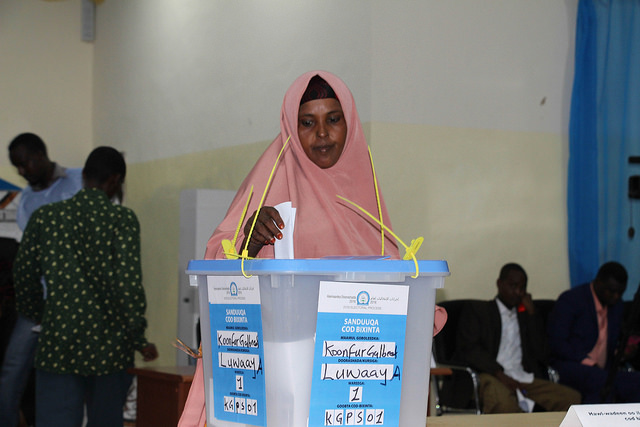With a week to go, can Somalia beat yet another electoral deadline?


A revised schedule issued by the Federal Indirect Electoral Implementation Team, FIEIT September following a failed deadline, indicated the Presidential elections would be held November 30 while Federal House members were to be sworn in today.
Exactly a week into Presidential vote, 131 members of the Lower House have so far been elected while four out of five states have successfully elected senators save for Somaliland which is yet to start the process. In total therefore, there are 43 Senators out of the constitutionally mandated 54.

Despite significant progress, the 30% quota for women still remains elusive with a total of 20 women having been elected thus far representing 7.3% of the full house-275 members and 15.3% of all the MPs elected to date.
Mid night oil
Voting for the Lower House members started November 5 and with one week to go to the presidential elections, the electoral bodies and all stakeholders will have to burn the midnight oil to elect the remaining 144 MPs while at the same time settle the Somaliland question.
Analysts however see this a tall order and the possibility of another delay is not a matter of if but when. Abdirashid Hashi, the director of the Mogadishu based think tank Heritage Institute for Policy Studies, HIPS says a spill over into December is now a reality.
“Majority of the MPs have not been elected and this is going to be difficult to achieve before end of the month. It is highly unlikely a new President will be elected on November 30,” observes Hashi.
Hashi notes the promise by politicians to deliver on elections is just on paper and in the process they create obstacles to make the deadlines unattainable. The elections will have to spill to December, the HIPS director adds.
US warns Galmudug
In a strongly worded letter this past week, the US embassy castigated what it termed as voter bribery, intimidation, use of state resources and collusion of electoral officials at state and federal level to compromise the electoral process in Galmudug. “Galmudug’s process thus far has been marred by more reports of overt interference than any other state. These examples have captured Washington’s and they are they are just a few of many examples we have received,” the letter addressed to Galmudug President Abdikarin Guled reads in part.
The UN also warned Sunday of what it noted as high-profile incidents of disregard for the rules and regulations.
Political science lecturer at Mogadishu University Dr. Liiban Hussein Muse contends with the possibility of a delay in the presidential poll but notes it wouldn’t be out of the ordinary if it is within a ten day range.
“It would be problematic if the timelines for delay is not clearly defined but it would not have any adverse effect if it extends by a week or ten days,” Dr. Liiban observes.
The FIEIT remains upbeat on delivering on their mandate despite the challenges. “We will continue to strive to get the elections of the House of the People completed,” FIEIT spokesman Mohamed Keynan told Goobjoog News. And this continues to be our priority for now.”
Election irregularities
Besides the actual process of voting which has been compounded by a fair of challenges, the electoral body has suspended two seats with in Jubbaland and HirShabelle. The seats were contested by Petroleum Minister Mohamed Mukhtar Ibrahim in Jubbaland and Youth and Sports Minister Mohamed Hassan Noah in HirShabelle. In a statement released Tuesday, the electoral body said it was investigating the HirShabelle case where the elections had earlier been suspended following a fracas in the polling station and gun violence.
Elections for other candidates however resumed Tuesday. In Jubbaland, FIEIT deputy spokesman Nafisa Santur told Goobjoog News Monday the polls body was already conducting investigations.
Another issue which the FIEIT has to deal with is filing the seat left by newly elected MP Dahir Geele who passed on in Garowe Sunday. “The procedure for filling the seat is not clear yet but most likely a by-election would happen,” Keynan told Goobjoog News.
Corruption
The completion of the exercise is one thing but questions abound the more on the quality of leadership the citizenry at large have to contend with in the next four years. Voter bribery and myriad of electoral malpractices have defined the process. In an interview with Voice of America, the Auditor General Dr. Nur Farah cast aspersions on the transparency of the electoral process noting a number of seats went to the highest bidder with some trading for as much as $1.3 million.
“Some votes were bought with $5,000, some with $10,000, and some with $20,000 or $30, 000,” said Farah, adding his office had recorded two seats costing their respective winners $1.3 million each.
Dr. Ise warns the level of corruption is a major setback and has largely demoralized Somalis who thought the expansion to include more delegates was a move forward towards a more legitimate poll.
“People are very demoralized with what is happening. They are saying the 2012 process which involved 135 elders was better than this. The money involved in this process in the form of corruption is humongous,” Ise states.
The road to 30% quota for women which translates to at least 82 seats in the 275 member chamber has been marred by a host of challenges a factors. Sharifo Adow a women rights activist who is also an election observer told Goobjoog News some regions are strongly resistant to the idea to include women in their lists. “I am in HirShabelle now and strange things are happening here. Some people threaten you if you advocate for the inclusion of women.”